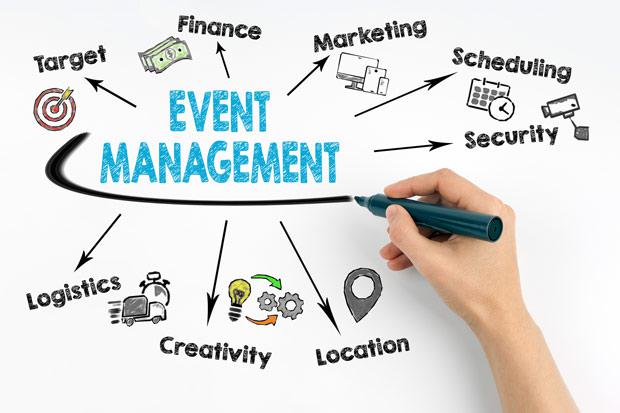A Deep Dive Into Just How Event Management Works to Produce Memorable Experiences
Event management is a complex self-control that combines various elements to craft unforgettable experiences. It calls for a clear understanding of the event's objective and target market. Coordinators must browse budgeting, logistics, and advertising and marketing to guarantee a seamless implementation. Each component plays an essential duty in accomplishing the desired influence. The journey does not finish with the event itself. There are insights to uncover that can shape future ventures.
The Fundamentals of Event Management
Effective event management includes a series of vital concepts that direct the planning and implementation of successful occasions. At its core, it entails recognizing the event's objective, audience, and wanted end results. Determining the target group is critical, as it educates decisions associated with content, advertising and marketing, and logistics.
Budgeting is an additional essential facet, guaranteeing that sources are assigned efficiently while satisfying the event's objectives. This includes preparation for unanticipated costs that might emerge.
Time management plays a crucial duty, as event managers must establish a detailed timeline to work with various tasks and landmarks.
Furthermore, effective communication amongst stakeholders, suppliers, and team participants is important to ensure positioning and prevent misconceptions.
Danger management must be thought about, with backup strategies in location to deal with prospective difficulties, thus improving the total experience for participants and ensuring a smooth implementation of the event.
Trick Roles in Event Planning
In event preparation, recognizing crucial functions is essential for successful implementation. The event planner is accountable for overseeing logistics and guaranteeing all aspects line up with the vision. Additionally, efficient vendor management is vital for keeping quality and promoting solid collaborations throughout the preparation process.
Event Coordinator Responsibilities
An occasion coordinator manages the intricate aspects of event planning, ensuring smooth execution from conception to final thought. They are accountable for conceiving the event motif, establishing spending plans, and creating timelines to keep the job on course. Coordination with stakeholders, consisting of customers, place supervisors, and volunteers, is vital to align assumptions and promote communication. The coordinator likewise manages logistics, such as food catering, transportation, and innovation requires, making certain all parts operate harmoniously. They perform site brows through, manage schedules, and troubleshoot issues that might arise during the event. Post-event, the coordinator reviews the event's success, collecting feedback and assessing outcomes to notify future jobs. This multifaceted function requires strong organizational skills, focus to detail, and effective interpersonal interaction.
Vendor Management Fundamentals
Guiding with the landscape of vendor management is important for effective event planning. Effective supplier management includes recognizing, picking, and collaborating distributors that supply important solutions, such as food catering, audiovisual assistance, and decoration. Event planners have to preserve strong communication with vendors to assure that all aspects straighten with the event's vision. Key duties consist of the supplier manager, that manages contracts and negotiations, and the logistics organizer, in charge of on-site arrangement and execution. It's crucial to establish clear assumptions and timelines, promoting a collective atmosphere that enhances the general experience. By focusing on these components, event planners can navigate prospective challenges, ensuring that every detail adds to a smooth and unforgettable event.
Crafting a Vision: Idea Growth

Once a vision is developed, it comes to be essential to translate it into actionable elements. This consists of defining the atmosphere, choosing ideal venues, and establishing the event's design. Working together with stakeholders, consisting of enrollers and partners, even more refines the concept, guaranteeing that all celebrations share a combined understanding of the event's objective. Eventually, a strong vision not just boosts attendee engagement but likewise sets the phase for unforgettable experiences that reverberate long after the event concludes.
Budgeting and Source Allotment
With a browse around these guys clear vision in area, the following action in event management includes mindful budgeting and source appropriation. This essential stage guarantees that all essential components are moneyed and lined up with the event's goals. Event supervisors start by estimating expenses associated with venue choice, catering, amusement, and advertising. They create a thorough budget plan that describes each group, permitting for openness and accountability.
Source allotment expands past financial resources; it additionally includes human resources. Identifying group functions, responsibilities, and timelines is necessary to ensure performance. Event supervisors have to likewise think about backups for unanticipated costs or adjustments in extent, developing a barrier within the spending plan.
Focusing on investing on elements that boost visitor experiences is important. By tactically alloting sources, event managers make best use of impact while preserving economic control. This self-displined method not just fosters effective events however also develops credibility and trust fund with stakeholders and individuals.
Logistics: The Backbone of Event Implementation
While budgeting lays the foundation for an event, logistics serve as its foundation, ensuring that every aspect is implemented efficiently and efficiently. charlotte event companies. This encompasses a broad range of tasks, consisting of place option, transportation plans, and tools blog here purchase. Reliable logistics management calls for precise planning and sychronisation to guarantee that all aspects line up with the event's timeline and purposes
Trick components of logistics consist of stock management, where supplies and products are tracked to avoid lacks, and staffing, which includes recruiting and training personnel to manage various jobs. Communication is likewise critical, as it assists in collaboration amongst vendors, enrollers, and the event team.

Marketing and Promo Approaches
Efficient marketing and promotion techniques are essential for taking full advantage of attendance and interaction at an occasion, as they produce rate of interest and excitement among prospective participants. Event managers employ a mix of conventional and digital marketing strategies to reach their target market. Social media platforms, email campaigns, and targeted advertisements are commonly used to create buzz and foster neighborhood interaction. Partnerships with influencers or market leaders can improve integrity, while involving web content such as video clips and testimonials can resonate with possible participants.
Additionally, leveraging event-specific hashtags and producing shareable graphics motivates organic promo among guests. Early bird ticket offers and exclusive promotions can incentivize enrollment, additionally increasing rate of interest. A properly designed website that supplies simple navigation and click this link clear details regarding the event can boost the user experience. By executing these advertising and marketing and promotion approaches, event supervisors can assure greater exposure and inevitably produce an unforgettable experience for all participants.

Gauging Success: Comments and Assessment
Success in event management hinges on durable feedback and evaluation devices. These processes are crucial for identifying the efficiency of an occasion and recognizing locations for improvement. By collecting input from guests, organizers can assess contentment levels, comprehend choices, and evaluate overall influence. Surveys and interviews function as valuable devices for collecting measurable and qualitative information, enabling extensive evaluation.
Furthermore, reviewing vital efficiency signs (KPIs) such as attendance rates, engagement degrees, and roi (ROI) offers a clearer image of event success. Post-event debriefing sessions with the preparation group likewise contribute insights, cultivating a culture of continuous renovation.
Inevitably, an organized approach to comments and assessment not only improves future events yet also reinforces partnerships with stakeholders. By applying these techniques, event managers can create remarkable experiences that resonate with participants and drive ongoing engagement.
Regularly Asked Inquiries
Exactly How Do Event Managers Manage Unforeseen Difficulties During an Occasion?
Event supervisors address unanticipated obstacles by staying tranquility, reviewing the situation, and applying backup strategies - charlotte event companies. They interact successfully with their team, adapt quickly, and focus on solutions to guarantee the event continues efficiently and successfully
What Technology Tools Are Important for Modern Event Management?
Essential modern technology tools for modern-day event management include event enrollment software application, task management applications, participant involvement platforms, and analytics tools. These resources simplify procedures, improve communication, and enhance general event experiences for organizers and participants alike.
How Do Cultural Distinctions Impact Event Planning and Execution?
Cultural differences substantially affect event planning and implementation. They impact themes, customs, communication styles, and assumptions, necessitating tailored techniques to guarantee inclusivity and respect, eventually forming the overall experience and success of the event.
What Are the Ethical Factors To Consider in Event Management?
Honest factors to consider in event management include transparency, sustainability, cultural sensitivity, and inclusivity. Planners must focus on fairness, regard diverse audiences, minimize environmental effect, and guarantee access to produce responsible and unforgettable experiences for all individuals.
Just How Can Sustainability Be Integrated Into Event Planning?
Sustainability can be incorporated into event planning by using environmentally friendly materials, decreasing waste, sourcing regional vendors, implementing carbon offset programs, and advertising electronic services to minimize paper use, thus enhancing ecological consciousness within the event's framework.